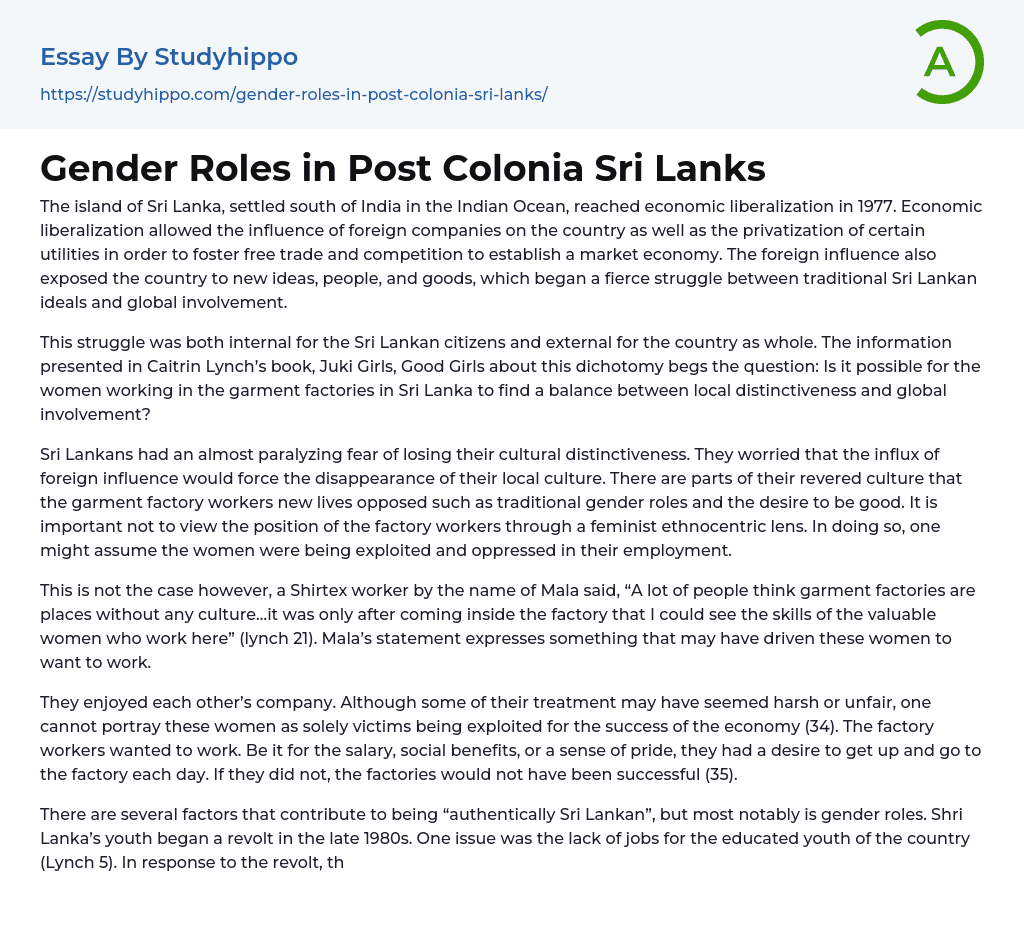The island of Sri Lanka, located south of India in the Indian Ocean, achieved economic liberalization in 1977. This liberalization allowed foreign companies to have an impact on the country and certain utilities were privatized to promote free trade and competition, leading to the establishment of a market economy. The presence of foreign influence also introduced new ideas, people, and products to Sri Lanka, sparking a significant conflict between traditional local values and global engagement. This conflict affected both the internal struggles of Sri Lankan citizens and the overall state of the country.
The book Juki Girls, Good Girls by Caitrin Lynch explores the issue of whether women working in garment factories in Sri Lanka can achieve a balance between their local culture and global engagement. Sri Lankans have expressed concerns about losing their cultural identity due t
...o foreign influences, including the impact on traditional gender roles and the importance of being virtuous. It is essential to approach the situation of these factory workers without applying a feminist ethnocentric perspective.
Despite the assumptions that women in their employment were exploited and oppressed, a Shirtex worker named Mala argues against this notion. She believes that people underestimate the cultural value and skills of the women in garment factories. Mala's statement suggests that these women were motivated to work due to their enjoyment of each other's company. While they may have experienced harsh or unfair treatment, it is inaccurate to depict them as mere victims of exploitation for the sake of economic prosperity (lynch 21, 34).
The factory workers had a strong motivation to go to work every day, whether it was for the salary, social benefits, or a sens
of pride. Without their dedication, the factories would not have thrived (35). Gender roles play a major role in defining what it means to be "authentically Sri Lankan". In the late 1980s, Sri Lanka's young generation initiated a rebellion due to the limited job opportunities available for educated young individuals in the country (Lynch 5).
In order to address the uprising, the Sri Lankan government introduced the 200 Garment Factory Program (200 GFP). This initiative aimed to construct garment factories across Sri Lanka's districts, with the objective of alleviating the discontent among young people. The primary goal of the 200 GFP was to generate employment opportunities for these youths and enhance Sri Lanka's participation in global trade. However, despite the creation of these jobs, societal concerns arose as the factories predominantly employed women, contradicting traditional gender roles.
In the past, men were traditionally responsible for providing for their families while women assumed the role of managing household duties and caring for children. The emergence of factory jobs presented women with a chance to socialize, acquire knowledge, and generate income. These newfound opportunities revealed the interconnection between individual culture and globalization. Sri Lankan women possess a strong desire to be perceived as "virtuous". However, working in a garment factory is frequently associated with negative associations as certain individuals label these women as "Juki girls", insinuating sexual promiscuity and defiance of societal norms (10).
According to Lynch (44-45), the women in the Shirtex factory demonstrated their desire for cultural adherence and respect by organizing a trip to attend their boss's father's funeral, even though they had never met him. They understood that it was a social obligation for Sri Lankans.
Being good factory workers meant not only being productive but also having noble character. Despite excelling at their jobs, these women struggled to maintain this status in society. It was the first time they had the ability to make purchases and have some financial independence.
The women working in the garment factories had the opportunity to purchase items for themselves that their families did not anticipate, like clothing and jewelry. However, this interest in fashion and contemporary ideas meant that they were embracing global concepts, which was seen as eroding their cultural distinctiveness. This situation demonstrates the difficult task these women faced in reconciling their desire for personal fulfillment with the obligation to preserve their cultural heritage. All things considered, these women encountered a challenging battle within the garment factories. It appeared highly improbable, maybe even unattainable, for them to ever achieve a perfect equilibrium in their new lives.
These women had to make sacrifices in order to maintain their double lives. The crucial inquiry is whether they were willing to sacrifice one aspect of their lives for another, and if the satisfaction derived from having a job they were proud of was worth enduring the negative perception associated with being a Juki girl. Furthermore, considering the constant changes in society, could they realistically continue to be fully dedicated to their cultural traditions?
- Woman essays
- Boy essays
- Homosexuality essays
- Masculinity essays
- Sexual Orientation essays
- Girl essays
- Man essays
- Lgbt essays
- Gay essays
- Gender essays
- Gender Identity essays
- Transgender essays
- Human Sexual Behavior essays
- Gender Stereotypes essays
- Gender Roles In Society essays
- Suicide In The LGBTQ essays
- Social Construction of Gender essays
- Anthropology essays
- Audience essays
- Charity essays
- Cultural Competence essays
- Emile Durkheim essays
- Gender Roles essays
- Generation essays
- Globalization essays
- Interpersonal Relationship essays
- People essays
- Race essays
- Social Change essays
- Social Class essays
- Social Movement essays
- Social Science essays
- Social Status essays
- Social Stratification essays
- Society essays
- Sociological Imagination essays
- Sociological Perspective essays
- Sociological Theories essays
- Stereotypes essays
- Web Dubois essays




